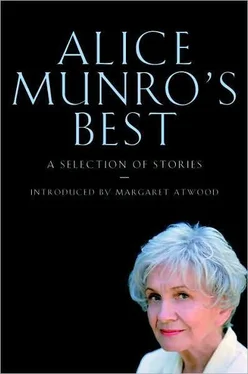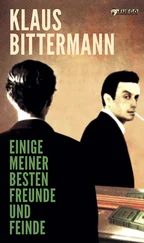Beryl said she had never had any idea ice came in pieces that big. She seemed intent on finding things strange, or horrible, or funny.
“Where in the world do you get ice that big?”
I couldn’t tell if that was a joke.
“Off of the lake,” I said.
“Off of the lake! Do you have lakes up here that have ice on them all summer?”
I told her how my father cut the ice on the lake every winter and hauled it home, and buried it in sawdust, and that kept it from melting.
Beryl said, “That’s amazing!”
“Well, it melts a little,” I said. I was deeply disappointed in Beryl.
“That’s really amazing.”
Beryl went along when I went to get the cows. A scarecrow in white slacks (this was what my father called her afterward), with a white sun hat tied under her chin by a flaunting red ribbon. Her fingernails and toenails — she wore sandals — were painted to match the ribbon. She wore the small, dark sunglasses people wore at that time. (Not the people I knew — they didn’t own sunglasses.) She had a big red mouth, a loud laugh, hair of an unnatural color and a high gloss, like cherry wood. She was so noisy and shiny, so glamorously got up, that it was hard to tell whether she was good-looking, or happy, or anything.
We didn’t have any conversation along the cowpath, because Beryl kept her distance from the cows and was busy watching where she stepped. Once I had them all tied in their stalls, she came closer. She lit a cigarette. Nobody smoked in the barn. My father and other farmers chewed tobacco there instead. I didn’t see how I could ask Beryl to chew tobacco.
“Can you get the milk out of them or does your father have to?” Beryl said. “Is it hard to do?”
I pulled some milk down through the cow’s teat. One of the barn cats came over and waited. I shot a thin stream into its mouth. The cat and I were both showing off.
“Doesn’t that hurt?” said Beryl. “Think if it was you.”
I had never thought of a cow’s teat as corresponding to any part of myself, and was shaken by this indecency. In fact, I could never grasp a warm, warty teat in such a firm and casual way again.
* * *
BERYL SLEPT IN a peach-colored rayon nightgown trimmed with écru lace. She had a robe to match. She was just as careful about the word écru as Mr. Florence was about his royal blue and pearl gray.
I managed to get undressed and put on my nightgown without any part of me being exposed at any time. An awkward business. I left my underpants on, and hoped that Beryl had done the same. The idea of sharing my bed with a grownup was a torment to me. But I did get to see the contents of what Beryl called her beauty kit. Hand-painted glass jars contained puffs of cotton wool, talcum powder, milky lotion, ice-blue astringent. Little pots of red and mauve rouge — rather greasy-looking. Blue and black pencils. Emery boards, a pumice stone, nail polish with an overpowering smell of bananas, face powder in a celluloid box shaped like a shell, with the name of a dessert — Apricot Delight.
I had heated some water on the coal-oil stove we used in summertime. Beryl scrubbed her face clean, and there was such a change that I almost expected to see makeup lying in strips in the washbowl, like the old wallpaper we had soaked and peeled. Beryl’s skin was pale now, covered with fine cracks, rather like the shiny mud at the bottom of puddles drying up in early summer.
“Look what happened to my skin,” she said. “Dieting. I weighed a hundred and sixty-nine pounds once, I took it off too fast and my face fell in on me. Now I’ve got this cream, though. It’s made from a secret formula and you can’t even buy it commercially. Smell it. See, it doesn’t smell all perfumy. It smells serious.”
She was patting the cream on her face with puffs of cotton wool, patting away until there was nothing to be seen on the surface.
“It smells like lard,” I said.
“Christ Almighty, I hope I haven’t been paying that kind of money to rub lard on my face. Don’t tell your mother I swear.”
She poured clean water into the drinking glass and wet her comb, then combed her hair wet and twisted each strand round her finger, clamping the twisted strand to her head with two crossed pins. I would be doing the same myself, a couple of years later.
“Always do your hair wet, else it’s no good doing it up at all,” Beryl said. “And always roll it under even if you want it to flip up. See?”
When I was doing my hair up — as I did for years — I sometimes thought of this, and thought that of all the pieces of advice people had given me, this was the one I had followed most carefully.
We put the lamp out and got into bed, and Beryl said, “I never knew it could get so dark. I’ve never known a dark that was as dark as this.” She was whispering. I was slow to understand that she was comparing country nights to city nights, and I wondered if the darkness in Netterfield County could really be greater than that in California.
“Honey?” whispered Beryl. “Are there any animals outside?”
“Cows,” I said.
“Yes, but wild animals? Are there bears?”
“Yes,” I said. My father had once found bear tracks and droppings in the bush, and the apples had all been torn off a wild apple tree. That was years ago, when he was a young man.
Beryl moaned and giggled. “Think if Mr. Florence had to go out in the night and he ran into a bear!”
NEXT DAY WAS Sunday. Beryl and Mr. Florence drove my brothers and me to Sunday school in the Chrysler. That was at ten o’clock in the morning. They came back at eleven to bring my parents to church.
“Hop in,” Beryl said to me. “You too,” she said to the boys. “We’re going for a drive.”
Beryl was dressed up in a satiny ivory dress with red dots, and a red-lined frill over the hips, and red high-heeled shoes. Mr. Florence wore a pale-blue summer suit.
“Aren’t you going to church?” I said. That was what people dressed up for, in my experience.
Beryl laughed. “Honey, this isn’t Mr. Florence’s kind of religion.”
I was used to going straight from Sunday school into church, and sitting for another hour and a half. In summer, the open windows let in the cedary smell of the graveyard and the occasional, almost sacrilegious sound of a car swooshing by on the road. Today we spent this time driving through country I had never seen before. I had never seen it, though it was less than twenty miles from home. Our truck went to the cheese factory, to church, and to town on Saturday nights. The nearest thing to a drive was when it went to the dump. I had seen the near end of Bell’s Lake, because that was where my father cut the ice in winter. You couldn’t get close to it in summer; the shoreline was all choked up with bulrushes. I had thought that the other end of the lake would look pretty much the same, but when we drove there today, I saw cottages, docks and boats, dark water reflecting the trees. All this and I hadn’t known about it. This too was Bell’s Lake. I was glad to have seen it at last, but in some way not altogether glad of the surprise.
Finally, a white frame building appeared, with verandas and potted flowers, and some twinkling poplar trees in front. The Wildwood Inn. Today the same building is covered with stucco and done up with Tudor beams and called the Hideaway. The poplar trees have been cut down for a parking lot.
On the way back to the church to pick up my parents, Mr. Florence turned in to the farm next to ours, which belonged to the McAllisters. The McAllisters were Catholics. Our two families were neighborly but not close.
“Come on, boys, out you get,” said Beryl to my brothers. “Not you,” she said to me. “You stay put.” She herded the little boys up to the porch, where some McAllisters were watching. They were in their raggedy home clothes, because their church, or Mass, or whatever it was, got out early. Mrs. McAllister came out and stood listening, rather dumbfounded, to Beryl’s laughing talk.
Читать дальше












